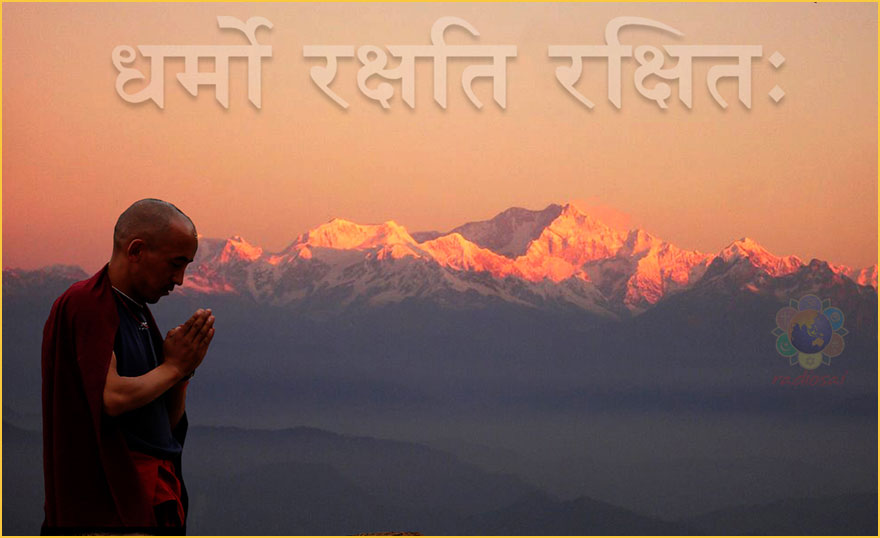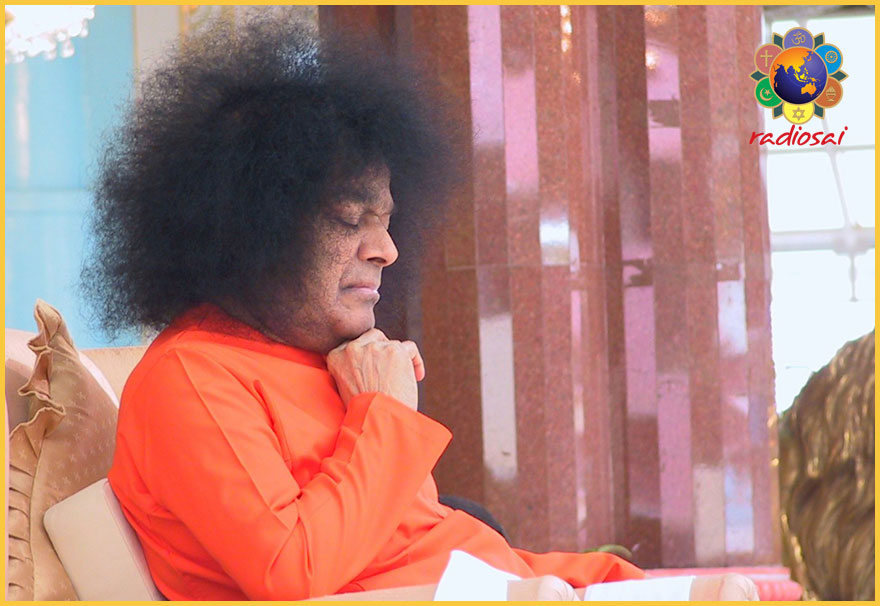|
|
| 'Like' us on Facebook | Follow us: |
Posted on: June 13, 2016
 |
Guru Poornima Special Offering
(Daily Episode)
Part - 5
In 2006, eager to start a service which will help everyone to connect with Bhagawan's teachings on a daily basis, Radio Sai began 'Sai Inspires'. All who subscribed to this service, received an email from us which had a concise message of Baba accompanied with His image. This daily offering was received well, and soon the subscriptions grew. Today nearly 100,000 people from all corners of the world wait for this message to help them tide over their day with peace and ease. The power inherent in these discourse capsules is indeed tremendous. How much we benefit from it and how best we harness this energy depends purely on how seriously we ruminate over these words and how sincerely we put our learning into action. To help us in this noble and elevating exercise, Prof. G. Venkataraman has taken time out to elaborate on these messages. His reflections will not only give us a deeper understanding into what the Lord is communicating to us but also give us tips to translate them into our daily practical life with more ease.
The best way to value the Master is to master His values. As we prepare to celebrate Guru Poornima (July 19), when we pay our respects and obeisance to the Divine Master, let us work to offer Him the tribute that the Lord loves the most from us - to make our lives His message, to make His love and wisdom shine in us. To aid us in this endeavour we have this series where Prof. Venkataraman for the next 26 days from June 9, 2016 shares his insights on select Sai Inspires messages. We hope this will help us to understand His teachings better and bolster our determination to walk on the sacred path.
Sai Inspires Message
DHARMA IS MUCH MORE THAN ROUTINE ETHICS
Men regard Dharma (right conduct) as merely ethical conduct in daily life. But this is not so. Dharma really means recognition of the Universal Consciousness that is in each individual and act on the basis of the unity of that Consciousness. When this Consciousness in man is enveloped in the ego, it assumes the form of three gunas or attributes (Satwa, Rajas, Tamas). When the Divine nature of this Consciousness is realized, it is transformed into Atma Dharma - the Dharma of the Self. True Dharma is the realization of the unity of the Omni-Self.
• Divine Discourse, November 23rd, 1986.
REFLECTIONS
Sai Ram. I would like to begin by drawing attention to two specific words in the opening line of this Sai quote; they are 1) Dharma and 2) ethics. The word Dharma is one of the five we commonly hear as human values namely, Sathya, Dharma, Santhi, Prema, Ahimsa. Though referred to as human values they are actually Divine in origin, and that is the first fact we ought to be clear about.
What do I mean by saying Sathya, Dharma, etc., are Divine in origin? Basically the following. Now God in the ultimate is nameless, formless and is supposed to be without attributes, there are in fact attributes latent in God. Indeed, every religion proclaims God as the most compassionate one. If compassion was not latent in God, how would He show it to a devotee who is in deep trouble and prays intensely for help?
 |
OK, we agree that latent in God are many attributes. What are they? There are many, but five that readily come to mind are indeed Sathya, Dharma, Santhi, Prema, and Ahimsa. Further, when God incarnates in human form, He manifests these attributes all the time, in some manner or the other. We all know that Rama was the embodiment of Sathya and Dharma and of course the others as well; the same was true of Krishna, and currently, we all adore Swami as the embodiment of Prema.
So God not only has certain values latent in Him but also makes them patent, especially when He comes down in human form. Fine, and we can now appreciate why Sathya, Dharma, etc., ought to be called Divine in origin. But why are they called human values? Because God expects humans to exhibit those same values in life; indeed, He expects that during their entire life, humans would put these values always on display. By the way, that exactly is why Swami often reminds us: YOUR LIFE SHOULD BE MY MESSAGE. Which makes abundantly clear that all of us ought to live our lives strongly adhering to Sathya and Dharma every moment of our lives.
So far, we have not brought the word ethics into the picture. Now what exactly is 'ethics'? The dictionary defines the word as: 'Moral principles that govern a person's or group's behaviour'. It is quite possible that historically, ethics and morality meant the same thing, that is to say, adherence to ethics also meant strictly following Dharma. Over a period of time, however, in the Western world, ethics has come to mean socially accepted set of codes and norms regarding behaviour. And since socially acceptable practices and behaviour change with time, so do ethical standards.
You see this, for example, in the movies. I do not know how it is these days, but way back in the fifties; for example, every single movie produced for commercial distribution had to be first certified by a film board of censors. The censors had a strict code and movie producers always tried to stay around the edge of the code, getting stuff past the censors, if they could get away with it. From what I gather, current standards are so different, that so-called sleazy stuff of the past would be regarded today as absolutely saintly! The point I am making is simply that the code of ethics is elastic and varies with time and the attitude of the society concerned. Moral values on the other hand, are immutable, since virtue which is the practical manifestation of moral values in action, is Divine in nature and origin.
In short, Dharma means much more than ethics. Based on this, one could draw up a rule book that says: Following Dharma means that thou shalt do this, this, and this, etc., followed by another set of rules that clearly draws red lines saying that thou shalt NOT do this, this, and this, etc. Now this is the beautiful and subtle message of Swami, and needs very careful attention. Bhagawan says, effectively:
O man! Dharma is not merely a rule with green and red lines. Dharma is the very Nature of God, and in as much as God is Consciousness itself – remember, the scriptures declare that God is verily Consciousness, Prajnanam Brahma! – you can claim to be following Dharma only if you recognize the presence of Consciousness everywhere, in everything, all the time!
If you think about it, that declaration raises the bar for Dharmic behaviour rather high. In other words, whatever we do, we must make sure that our actions do not hurt any being, for God is in that being. It must not harm society, for society is God. It must not harm Nature, for Nature is God, and it must not go against our own Conscience, for Conscience is the Ultimate Master of each and every one of us!
 |
Swami makes this clear by adding [effectively of course]:
O man! As long as you remain bound by the gunas, you would also have some kind of prejudice, dislike, tendency to become angry, jealous, greedy, selfish, etc.
All such negativity binds you and chains you from strictly following Dharma in the sense I have defined. So, if you truly wish to be Dharmic, then follow the golden rules:
• Rise above the gunas. This won’t happen in a day, but keep trying and trying hard.
• See God everywhere and all the time, so that all of your actions become pleasing to God.
• And never go against your Conscience, since Conscience is verily God!
That is essentially what Swami is telling us, and that is the essence of the quote we started with.
These days, Spirituality has been reduced to a seemingly simple drill. Just say, “I love you Swami,” and everything gets taken care of. Atleast a large number of people believe so. All this is happening because most people choose to ignore the fine print and tune the definition to suit their own, particular convenience. Swami is reminding us that that action alone is Dharmic, which pleases God. Thus, pleasing God doesn't mean merely doing what we like and shouting, “WE LOVE YOU SWAMI!” It means paying careful attention to what Swami is telling us and following them as strictly as possible in daily life.
Think about it!
Radio Sai Team
| comments powered by Disqus |






